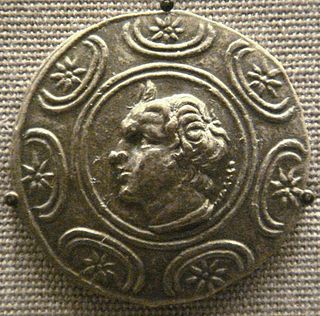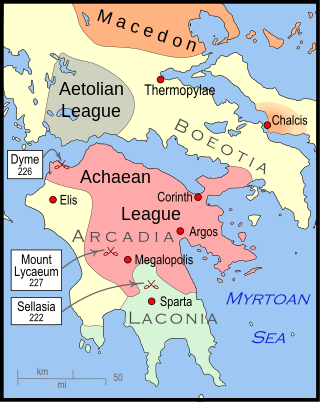Related Research Articles
The 4th century BCE started the first day of 400 BC and ended the last day of 301 BC. It is considered part of the Classical era, epoch, or historical period.
This article concerns the period 229 BC – 220 BC.
This article concerns the period 319 BC – 310 BC.

This article concerns the period 309 BC – 300 BC.
This article concerns the period 289 BC – 280 BC.
This article concerns the period 279 BC – 270 BC.
This article concerns the period 269 BC – 260 BC.
Year 229 BC was a year of the pre-Julian Roman calendar. At the time it was known as the Year of the Consulship of Albinus and Centumalus. The denomination 229 BC for this year has been used since the early medieval period when the Anno Domini calendar era became the prevalent method in Europe for naming years.
Year 253 BC was a year of the pre-Julian Roman calendar. At the time it was known as the Year of the Consulship of Caepio and Blaesus. The denomination 253 BC for this year has been used since the early medieval period, when the Anno Domini calendar era became the prevalent method in Europe for naming years.
Year 310 BC was a year of the pre-Julian Roman calendar. At the time, it was known as the Year of the Consulship of Rullianus and Censorinus. The denomination 310 BC for this year has been used since the early medieval period, when the Anno Domini calendar era became the prevalent method in Europe for naming years.
Year 267 BC was a year of the pre-Julian Roman calendar. At the time it was known as the Year of the Consulship of Regulus and Libo. The denomination 267 BC for this year has been used since the early medieval period, when the Anno Domini calendar era became the prevalent method in Europe for naming years.
Year 315 BC was a year of the pre-Julian Roman calendar. At the time, it was known as the Year of the Consulship of Cursor and Philo. The denomination 315 BC for this year has been used since the early medieval period, when the Anno Domini calendar era became the prevalent method in Europe for naming years.
Year 316 BC was a year of the pre-Julian Roman calendar. At the time, it was known as the Year of the Consulship of Rutilus and Laenas. The denomination 316 BC for this year has been used since the early medieval period, when the Anno Domini calendar era became the prevalent method in Europe for naming years.
Year 309 BC was a year of the pre-Julian Roman calendar. At the time, it was known as the Year of the Dictatorship of Cursor. The denomination 309 BC for this year has been used since the early medieval period, when the Anno Domini calendar era became the prevalent method in Europe for naming years.

Antigonus II Gonatas was a Macedonian Greek ruler who solidified the position of the Antigonid dynasty in Macedon after a long period defined by anarchy and chaos and acquired fame for his victory over the Gauls who had invaded the Balkans.

Hellenistic Greece is the historical period of the country following Classical Greece, between the death of Alexander the Great in 323 BC and the annexation of the classical Greek Achaean League heartlands by the Roman Republic. This culminated at the Battle of Corinth in 146 BC, a crushing Roman victory in the Peloponnese that led to the destruction of Corinth and ushered in the period of Roman Greece. Hellenistic Greece's definitive end was with the Battle of Actium in 31 BC, when the future emperor Augustus defeated Greek Ptolemaic queen Cleopatra VII and Mark Antony, the next year taking over Alexandria, the last great center of Hellenistic Greece.

The Chremonidean War was fought by a coalition of some Greek city-states and Ptolemaic Egypt against Antigonid Macedonian domination. It ended in a Macedonian victory which confirmed Antigonid control over the city-states of Greece.
Chremonides, son of Eteokles of Aithalidai, was an Athenian 3rd century BC statesman and general. He issued the Decree of Chremonides in 268 BC, creating an alliance between Sparta, Athens, and Ptolemy II, the Macedonian King of Egypt. This was a defensive alliance against King Antigonus of Macedon which led to the Chremonidean War.

The Cleomenean War was fought between Sparta and the Achaean League for the control of the Peloponnese. Under the leadership of king Cleomenes III, Sparta initially had the upper hand, which forced the Achaean League to call for help the Macedonian king Antigonos Doson, who decisively defeated Cleomenes in the battle of Sellasia in 222.

The kingdom of Macedonia was an ancient state in what is now the Macedonian region of northern Greece, founded in the mid-7th century BC during the period of Archaic Greece and lasting until the mid-2nd century BC. Led first by the Argead dynasty of kings, Macedonia became a vassal state of the Achaemenid Empire of ancient Persia during the reigns of Amyntas I of Macedon and his son Alexander I of Macedon. The period of Achaemenid Macedonia came to an end in roughly 479 BC with the ultimate Greek victory against the second Persian invasion of Greece led by Xerxes I and the withdrawal of Persian forces from the European mainland.